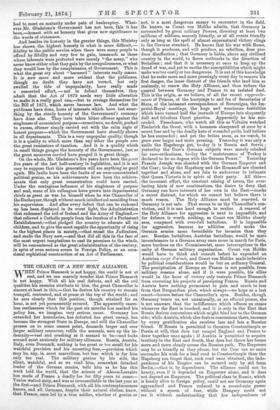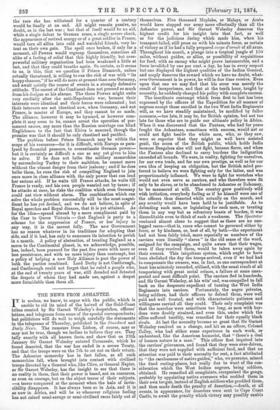THE CHANCE OF A NEW HOLY ALLIANCE.
WHEN Prince Bismarck is not happy, the world is not at rest, and we can scarcely wonder that Prince Bismarck is not happy. With all his real defects, and all the evil qualities his enemies attribute to him, the great Chancellor is sincere at least in this,—that he desires his country to remain tranquil, contented, and at peace at the top of the world ; and he sees clearly that this position, though attained for an hour, is not yet permanently secured. The apparently cause- less restlessness which for the past six months has marked his policy has, we imagine, very serious cause. Germany has extended her boundaries, has defeated her great enemy, has become the strongest State in Europe, and still the Chancellor presses on to some unseen point, demands larger and ever larger military resources, refills the arsenals, uses up the in- demnity—vast and crushing as it seemed to be—and looks around most anxiously for military alliances. Russia, Austria, Italy, even Denmark, nothing is too great or too small for his watchful prevision and his unresting fear,—prevision which may be, nay, is, most marvellous, but fear which is for him only too real. The military genius by his side, the silent, watchful, and as we read him, somewhat detached leader of the German armies, tells him as he has this week told the world, that the seizure of Alsace-Lorraine has made of France a deadly foe for fifty years to come— Venice waited sixty, and was as irreconcilable in the last year as the first—and Prince Bismarck, with all his contemptuousness knows, and all Germans, despite their natural elation, know, that France, once led by a true soldier, whether of genius or not, is a most dangerous enemy to encounter in the field. He knows, as Count von Moltke admits, that Germany is surrounded by great military Powers, directing at least two millions of soldiers, scarcely friendly, or at all events friendly only as long as the spell of almost supernatural victory clings to the German standard. He knows that his war with Rome, though it produces, and will produce, no rebellion, does pro- duce disaffection ; that Germany is liable, above any civilised country in the world, to fierce outbreaks in the direction of Socialism ; and that it is necessary at once to keep up the dread of war, and yet to soothe the susceptibilities which might make war too costly or too dangerous. It is out of this knowledge that he seeks more and more pressingly every day to remove his first danger, the inner distrust of the friends who laud him so zealously, to renew the Holy Alliance, and thus reduce the quarrel between Germany and France to an isolated duel. This is the origin, as we believe, of all the recent rapprocht- meats of Princes, of the hurryings to and fro of Secretaries of State, of the incessant correspondence of Sovereigns, the Im- perial-Royal meetings, the huge and wearisome festivities which have turned half the journals of Europe into eloquently dull and frivolous Court gazettes. Apparently he has suc- ceeded. Frenchmen, who watch all this as Voltaire watched Frederick the Great, with a keenness sharpened at once by a secret fear and by the deadly hate of wounded pride, half believe he has succeeded ; and yet the bribes seem, as we watch, to grow ever larger and more pressing. Yesterday it was only a smile the Hapsburgs got, to-day it is Bosnia and Servia ; yesterday the Czar's German subjects were merely rebuked for race-enthusiasm, to-day the " maintenance of Turkey is declared to be no dogma with the German Power." Yesterday Francis Joseph was closeted with the German Emperor and the Czar ; to-day the Hapsburg and the Romanoff are closeted together and alone, and are fain to endeavour to intimate that Queen Victoria is in spirit of their party. All this— the incessant effort, the constant raising of terms, the ever- lasting hints of new combinations, the desire to deny that Germany can have interests of her own in the East—marks a secret distrust, for which we cannot but believe there is much reason. The Holy Alliance must be renewed, or Germany is not safe. That seems to us the Chancellor's con- viction, and it is one bard enough to realise. A renewal of the Holy Alliance for aggression is next to impossible, and for defence is worth nothing, as Count von Moltke clearly sees, compared with over-full battalions. It is impossible for aggression, because no addition could make the German armies more formidable for invasion than they are. Russian battalions, Austrian battalions, would be mere incumbrances to a German army once more in march for Paris, mere burdens on the Commissariat, mere interruptions to the unity of German military organisation. Count von Moltke would have to think and consult before he expended an Austrian corps (farms's, and Count von Moltke made indecisive by political considerations would be but an ordinary General. The precipitation of Europe on France is not possible, from military reasons alone, and if it were possible, his allies would in the hour of victory only restrain Prince Bismarck from executing his projects of paralysing France. Russia and Austria have nothing permanent to gain and much to lose from that Burgundian plan, which always—we hope as a last resort—hovers before the Chancellor's eyes. Besides, though Germany treats us, not unnaturally, as an effaced power, she is not unaware that the indifference which effaces us ceases whenever the East is touched, and it is only in the East that Russia desires concessions which might bind her to the German side; while Austria, which also desires concessions there, becomes by every gratification she receives less and less a Russian friend. If Russia is permitted to threaten Constantinople or Persia at will, that does but compel England and France to draw together once again ; if Austria is permitted to acquire territory to the East and South, that does but throw her forces more and more clearly across the Russian path. The Emperors may be as friendly as they please, but the Czar can no more surrender his wish for a land road to Constantinople than the Hapsburg can forget that, such road once obtained, the inde- pendence of his Empire can be secured only by aid from Berlin,—that is, by dependence. The alliance could not be hearty, even if it depended on Emperors alone, and it does not depend on Emperors. The political class in Russia, which is keenly alive to foreign policy, could not see Germany again aggrandised and France reduced to a second-rate power without a spasm of fear, while Hungary could not see it without understanding that her independence of bribe them, he runs the risk of compelling England to join ferred to believe we were fighting only for the latter, and was once more in close alliance with the only power that can lend proportionately inflamed. We were to fight for wretches who her serious aid. If he waits till France attacks, he waits till would not even serve as carriers, and who therefore were fit France is ready, and his own people wearied out by taxes ; if only to be slaves, or to be abandoned to Ashantee or Dahomey, he attacks at once, he risks the coalition which even Germany to be massacred at will. The country grew positively wild could not view without alarm. The combination which can with irritation, everybody feeling as if he himself were one of solve the whole problem successfully will be the most magni- the officers thus deserted while actually on the march, and Recut he has yet devised, and we do not believe, in spite of any severity would have been held to be justifiable. As to Royal speeches and Royal dinners, that it is yet attained. As defending such men, or legislating for such men, or treating for the idea—spread abroad by a mere compliment paid by them in any way but as refractory beasts of burden, it was the Czar to Queen Victoria — that England is party to a discreditable even to think of such a weakness. The Spectator scheme for the suppression of France, or her injury in ventured almost alone to suggest that as there are no one- any way, it is the merest folly. The new Government legged races—that is, races who cannot be governed either by has no reason whatever in its traditions for adopting that force, or by kindness, or, best of all, by both—the experiment side, and if it had, has only to announce its intention to perish had not been fairly tried, more especially as numbers of the in a month. A policy of abstention, of treating England as a carriers were literally " slaves " in the old sense of the word, moon to the Continental planet, is, we acknowledge, possible, assigned for the campaign, and quite aware that their wages, has, indeed, been pursued for the past five years with more or even if they received them, would be taken away again by less persistence, and with no more injury than contempt, but their owners. This iniquitous system, which ought to have a policy of helping a new Holy Alliance is past the power of been abolished the day the troops arrived, even if we had had both the parties combined. Lord Derby is not Castlereagh, to compensate the owners, was, in fact, as one correspondent at and Castlereagh could not forget that he ruled a people who, least has minutely recorded, utilised, with the usual result of all at the end of twenty years of war, still dreaded and detested temporising with great social crimes, a failure at some unex- the despots of whom they had made use, against a despot petted and most difficult point. The carriers fled in hundreds,



































 Previous page
Previous page